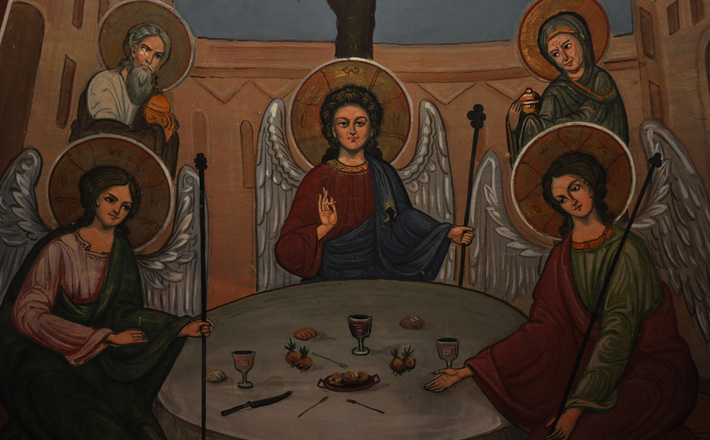Commentary on Romans 5:1-5
In the space of five verses, the second reading for Trinity Sunday mentions God, Christ, and the Holy Spirit.
We have peace with God (verse 1). This peace, as well as access to grace, has come through Jesus Christ (verse 2). Moreover, God’s love has been poured into our hearts through the Holy Spirit (verse 5). The Son gives us access to God’s glory and the Spirit pours out God’s love for us.
The reading, however, is something more than a lesson on the Trinity. It is first of all a bridge between the “What?” of Romans 1-4 and the “Now What?” of Romans 5-8. In Romans 1 and 2, Paul demonstrates the universality of the power of Sin over human beings: both Jews and gentiles have fallen short of the glory of God. In Romans 3 and 4, Paul announces God’s response to humanity’s plight: because of Christ’s righteousness, humanity now stands justified by God’s grace (cf. Romans 3:21-26). Boasting is excluded; Paul goes on, because “a person is justified by faith apart from works prescribed by the law” (Romans 3:28, NRSV).
Interestingly, Romans does not end at the end of chapter 4. Justification is not the religious equivalent of the fairy tale ending, “They lived happily ever after.” In chapters 5 through 8 of Romans, Paul turns to answering the “Now what?” question. As he does so, we see that in the world Christ has redeemed, Sin continues to exercise influence (cf. Romans 7) and suffering remains so acute that Paul is at pains to say it cannot separate us from God’s love (cf. Romans 8). According to Romans 5:1-5, the life of the justified is a mix of peace, hope, suffering, and love. These themes, as well as the glory of God, will all be discussed again and expanded in Romans 8:18-39.
Peace
While some manuscripts contain the hortatory subjunctive meaning, “let us have peace,” most if not all English translations regard the verb as the indicative, “we have peace.” The NET Bible notes, available at http://www.net.bible.org, document the arguments for each reading and settle on the indicative. Either way, peace is a present possibility for those who have been made right, or justified before God. Justice and peace go together. One is reminded of Isaiah 32:17, “The effect of righteousness will be peace” or those places in the Psalms where peace and righteousness exist together (cf. Psalms 72:7; 85:10).
Hope
We have hope as well. Paul says, “We boast in our hope of sharing God’s glory.” NRSV has added “sharing” to the text to clarify what it means to hope in the glory of God. The word for “boast” (kauchometha) also means “rejoice” or “exalt in.”
Paul’s rhetoric here resembles the late night infomercial. Through Jesus Christ, we have peace with God. We also have access to the grace in which we stand. But wait! There’s more! We have the hope of sharing in God’s glory. We boast in this hope, recognizing that it exists side by side with suffering.
Suffering
In Romans 8, Paul will say “the sufferings of this present time are not worth comparing to the glory about to be revealed to us” (v. 18). In Romans 5, Paul says that we rejoice not only in the glory of God but also in our sufferings. The message is not that Paul and his readers rejoice because they are suffering but rather that they rejoice in the midst of suffering. Suffering does not produce our rejoicing or boasting; rather, it cannot squash them.
The current status of believers has two implications for how we understand suffering.
- God’s Spirit has been poured into our hearts, Paul says. For first-century Jews like Paul, the outpouring of the Spirit would be a sign that the turn of the ages was underway (cf. Joel 2:28-29). We may rejoice in the midst of suffering because we know that it is temporary: another chapter has begun and the future for which we hope is already changing the way we live.
- We have been justified. Religious traditions always flirt with the idea that suffering is somehow “payback” for sin. If that were true, then suffering people would have to wonder, “What did I do wrong?” Some of Job’s misguided friends suggest that he undertake just such self-examination. For those made righteous by Christ’s faithfulness, however, suffering is not a sign of God’s lack of favor toward us chiefly because God has no lack of favor toward us. Rather, God has shown what Katherine Grieb calls “outrageous generosity” toward us (p. 62): “While we were sinners, Christ died for us” (Romans 5:8).[1] In the context of such grace, suffering finally only works to strengthen the resolve and character of those enduring it.
Love
This is the first time Paul mentions love in the letter to the Romans. Grammarians discuss whether the genitive construction, “love of God,” should be objective (meaning the love that we have for God) or subjective (meaning the love that God has for us). The NET Bible notes argue for a plenary genitive, meaning that both love from God and for God are in view. It seems an appropriate work of the Spirit both to communicate God’s love for us and to make it possible for us to love God. This, perhaps, is the Trinitarian word for the day. Christ has acted out God’s love for us. It is that same love of the same God that the Spirit pours out to, and through, us.
[1] A. Katherine Grieb, The Story of Romans: A Narrative Defense of God’s Righteousness (Louisville: Westminster/John Knox, 2002), 62.


May 26, 2013